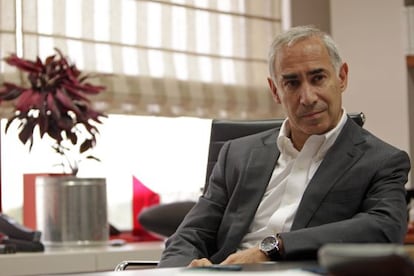“We have the best network; now we must improve our customer service”
Vodafone España CEO António Coimbra talks about his plans to straighten out the company

António Coimbra has been the chief executive officer of Vodafone España since September of last year. He was brought in from Portugal to straighten out the company and recently presented a plan for the group that envisages a return to growth in three years. Vodafone will invest to improve the quality of its service, not only in its network but also to attract call centers to Spain, while introducing a system for replacing lost or broken cellphones.
During the interview, Coimbra complains about what he claims is still the virtual monopoly of rival Telefónica - whom he refers to as the "incumbent" - in contracts with Spanish public administrations. He also raises Vodafone's objections to the recent deal between Telefónica and Yoigo, under which the former will offer 4G services on Yoigo's network, with the latter allowed to market a package that includes its own mobile services and Telefónica's broadband ADSL and fiber-optic services. Coimbra describes this deal as a closet merger. Vodafone's $130-billion windfall from the sale of its stake in Verizon Wireless could pave the way for acquisitions but Coimbra is coy about whether the telecoms operator has any of its smaller rivals in Spain in sight.
Question. You have been a year in the job. The revenues, gross operating profit in the form of EBITDA and customer base of Vodafone España have been falling for the past five years. How do you plan to turn the situation about?
Answer. We want to move from a purely commercial business model to one based on service, for which we have a three-year plan that entails a commitment to strong investment. The plan has been approved by the group and it was started in April. The first year will be one of transformation, the second of consolidation and the third of growth. In the third year we expect to see a return to growth in revenues, EBITDA and in customers.
It's shameful after 20 years of liberalization that things are still done in this way"
Q. What does this plan entail?
A. We're beginning a new cycle with fixed-line super broadband, fiber-optic and fourth-generation mobile. This represents an opportunity if you manage to get ahead of the game. That's why we have been the first to launch 4G. We have invested 500 million euros in fiber-optic and we're looking to launch commercially in May or April 2014.
Q. Your rivals are not standing still. Orange is at your heels.
A. We are looking to be the main alternative to the incumbent both in fixed-line as well as mobile, particularly for companies. We also want to put some distance between ourselves and the third-biggest operator.
In areas connected with our growth plans there will be hiring"
Q. It is said that Vodafone is falling down when it comes to customer service, because it isn't based in Spain.
A. We already have the best network, the fastest. Now we have to improve customer service. All queries from companies are attended to from here and we will complete doing so for all residential contracts within a year. We will only maintain our Latin American service, which is top rated in terms of customer satisfaction, for our prepaid customers.
Q. You are also going to revamp your distribution network and close stores...
A. We want to have a distribution channel with bigger and better-located stores. The model is one not only for sales but also for service. That's why we're moving from having 1,500 stores to 1,000. We're also reinforcing online auto-service; everything you can do at a store or by telephone you can also do on the web through voice recognition or through a mobile app. Some 60 percent of the communications with Vodafone are done through one of these channels. Now we're looking to improve post-sale service.
In fixed-line we have never seen the incumbent use a rival as a distributor"
Q. How?
A. For example, we are going to set up a breakdown solution for people who lose or break their terminals so that it doesn't become a disaster, because nobody can live without their mobile nowadays.
Q. You mean you're going to offer replacement terminals?
A. I can't tell you any more.
Q. Speaking of handsets, Telefónica says it's not going to subsidize them and instead sell them freely.
A. We're spending less on acquiring and retaining customers. We still have to subsidize, as all, and I mean all, operators do, and we ourselves have to do so if we want to be competitive. As regards terminals, when a customer ends their contract, they can ask to have their handset unblocked for eight euros. We are also selling terminals under better conditions because of the volume of our purchases, which more than compensates for those eight euros.
Q. It's striking that within barely a year, Jazztel and Ono, without having a network, are stealing mobile customers from the three big companies.
A. The strategy of those two operators is aimed at protecting their fixed-line customer base and that is why they have added mobile services. But the customers they are winning are low consumption. It is true that Vodafone has been losing customers because of portability, but increasingly fewer; between 10,000 and 20,000 contract customers and falling. We believe that shortly we can turn these figures around, at least for contract customers.
Q. Why doesn't Vodafone try to hold onto its mobile customers by making them a good broadband offer?
A. That's what we're doing. For fixed-line, we have positive portability figures: between 30,000 and 40,000 customers a quarter. Of the traditional fixed-line only competitors, one has negative figures [Ono] and the other [Jazztel] slightly positive. Some 70 percent of our fixed-line customers are also mobile customers. The packages we are offering are very successful, with a total of 2.4 million customers. And a third of them have come from our rivals.
Q. But in the end it seems that the 19.99 euros for all-in services Jazztel and other operators offer is winning out.
A. That's an advertising stunt because it doesn't include the line-rental charge. We have already complained about this and I hope that they will solve the problem soon. It's 35 euros rather than 20 and for that price Vodafone gives a lot more.
Q. Has the agreement between Yoigo and Telefónica caused you a lot of annoyance?
A. In fixed-line we have never seen the incumbent use a rival as a distributor of one of its own products such as Fusión. And as regards 4G it seems clear that this is not a roaming agreement, but a cession of spectrum by Yoigo so that Telefónica can start to provide its service. That was a spectrum that we had to hand back so that it could go out to tender. I find it surprising. That's why we have asked the Competition Commission and the secretary of state to get involved. If you combine both things, distribution and spectrum, it looks like a closet merger. And we are ready to go to the law courts and to Brussels.
Q. Vodafone complains that Telefónica gets all the contracts from the public administrations.
A. It must be almost the only case in Europe of an incumbent winning more than 80 percent of the value of the contracts of the public administrations. It's shameful that after 20 years of liberalization, things are still done in this way and that the monopoly remains in place. The government has to act.
Q. With the money from Verizon are you going on the acquisition trail? Will some of it come to Spain? There's talk of Jazztel, Yoigo and Ono.
A. The group has drawn up its Spring Project to move 7 billion euros to speed up the roll-out of its networks. There are four main destination countries: Britain, Italy, Germany and Spain. In November we will present our plan for how the funds will be used. But this is a question of speeding up investment. Anything to do with acquisitions is a shareholder's decision.
Q. Vodafone introduced its labor workforce adjustment plan a year ago. Will there be more job cuts?
A. No, quite the opposite. In areas connected with our growth plans there will be hiring.
Tu suscripción se está usando en otro dispositivo
¿Quieres añadir otro usuario a tu suscripción?
Si continúas leyendo en este dispositivo, no se podrá leer en el otro.
FlechaTu suscripción se está usando en otro dispositivo y solo puedes acceder a EL PAÍS desde un dispositivo a la vez.
Si quieres compartir tu cuenta, cambia tu suscripción a la modalidad Premium, así podrás añadir otro usuario. Cada uno accederá con su propia cuenta de email, lo que os permitirá personalizar vuestra experiencia en EL PAÍS.
¿Tienes una suscripción de empresa? Accede aquí para contratar más cuentas.
En el caso de no saber quién está usando tu cuenta, te recomendamos cambiar tu contraseña aquí.
Si decides continuar compartiendo tu cuenta, este mensaje se mostrará en tu dispositivo y en el de la otra persona que está usando tu cuenta de forma indefinida, afectando a tu experiencia de lectura. Puedes consultar aquí los términos y condiciones de la suscripción digital.









































